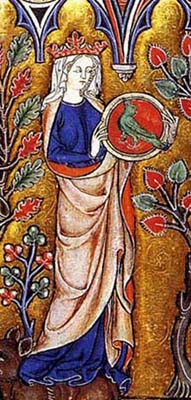 |
The Saint of the Day
St. Teresa of Portugal – June 17
Prof. Plinio Corrêa de Oliveira
Biographical selection:
Teresa was the eldest daughter of King Sancho I of Portugal and the sister of Saints Mafalda and Sancha. She married her cousin, King Alfonso IX of Leon.
The couple had several children, but the marriage was declared invalid for the reason of consanguinity. She retuned to Portugal and founded a Cistercian Convent for 300 nuns in Lorvão. Teresa then moved into the convent, although she did not take vows.
In 1231, at the request of Alfonso’s second wife and widow Berengaria, she left to settle a bitter succession dispute between their children over the throne of Leon. With peace between them, she returned to the convent, took vows, and remained there as a nun for the rest of her life.
Comments of Prof. Plinio:
There are two categories of Saints in popular devotion: those whom one speaks about and prays to, and those who are in the “archives,” filed away in silence. This latter category of saints is not spoken of or invoked.
In a certain way, this is normal because the Church has so many saints that some naturally draw more attention than others; thus the latter fall into oblivion. To a certain degree this corresponds to the history of Divine Providence. Such saints remain in the Calendar of Saints, are remembered in the regions where they lived or the religious orders to which they belonged, but they do not attain a large, widespread devotion. When History ends, they will be venerated in Heaven by all those of lesser sanctity. This is normal and understandable.

Queens Saints - like St. Teresa of Portugal - are barely known
|
But it is not natural that all the saints who irritate a sentimental piety that dominates many circles in the Church move rapidly to the category of “forgotten saints.” At the same time, others who are often presented under the deformed prism of this piety seldom or never fall into such oblivion. For instance, there is systematic silence regarding Kings, Queens, and Princes who were saints. Who among us had ever heard about St. Teresa of Portugal? Before reading this selection, I did not know that she existed; nor did I know anything about her sisters, who are also saints.
It would be good for us, as counter-revolutionaries, to recover these saints, raise them from oblivion and offer them the devotion they deserve. It is curious to note how this sentimental piety constantly sabotages anti-egalitarian saints from receiving worship. Consciously or unconsciously, it favors the Revolution. If we would make a compilation of all the saints that were set aside by this dubious school of piety, we would have a magnificent gallery of counter-revolutionary saints.
What this insufficient excerpt tells us is that St. Teresa was Queen of Leon for a time, her marriage was annulled, and she founded a Convent in Portugal after she returned to her homeland. Also, she was called to settle a dispute over the succession of the throne of Leon in which her children were involved.
It is a cold exposition of a few facts without any details of her moral life and virtues. This chronology does not allow us to make any particular comment. It is an implicit invitation to set her aside. Again, it looks like her rich life was sabotaged, confirming what we said about the biases of the school of sentimental piety.
Let us ask St. Teresa of Portugal - and her sisters St. Mafalda and St. Sancha - to help us find the more counter-revolutionary saints and bring them to light for the greater glory of God.


  | | Prof. Plinio Corrêa de Oliveira | |
The Saint of the Day features highlights from the lives of saints based on comments made by the late Prof. Plinio Corrêa de Oliveira. Following the example of St. John Bosco who used to make similar talks for the boys of his College, each evening it was Prof. Plinio’s custom to make a short commentary on the lives of the next day’s saint in a meeting for youth in order to encourage them in the practice of virtue and love for the Catholic Church. TIA thought that its readers could profit from these valuable commentaries.
The texts of both the biographical data and the comments come from personal notes taken by Atila S. Guimarães from 1964 to 1995. Given the fact that the source is a personal notebook, it is possible that at times the biographic notes transcribed here will not rigorously follow the original text read by Prof. Plinio. The commentaries have also been adapted and translated for TIA’s site.
|
Saint of the Day | Home | Books | CDs | Search | Contact Us | Donate

© 2002- Tradition in Action, Inc. All Rights Reserved
|
 |

|